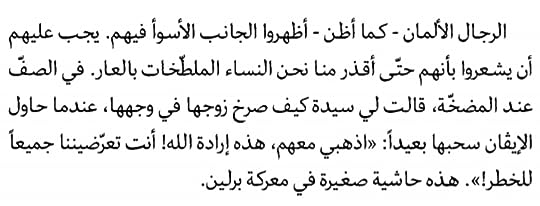What do you think?
Rate this book


261 pages, Paperback
First published January 1, 1953

"ثبت أن الخطر الذي يهدّد حياتك يقوّي عزيمتك على الحياة. شعلة حياتي تحترق ساطعة أكثر مّما كانت عليه قبل قنابل الحرب. كل يوم جديد من حياتي هو يوم انتصار. تحدٍّ؛ أن تقف منتصباً، وبثبات على الأرض. في ذلك اليوم، المّرة الأولى التي اهتزّت فيها الجدران من القنابل، كتبتُ بعض أبيات من الشعر اللاتيني على جدار غرفتي، لا أزال أذكرهم حتّى الآن:
إذا انهدم العالم من حولكَ
حطامه سيُبقيكَ شجاعاً
*هوراس، الكتاب الثالث، القصيدة الثالثة، السطر السابع"

يقول إرنست توللر: "الإنسان هو الخاسر الأكبر في كل حرب"
"محنتنا الروحية عظيمة. نحن ننتظر كلمة، تُدخَل في قلوبنا، وتُعيدنا إلى الحياة. قلوبنا تبدّدت، نحن بحاجة إلى تغذية."
"أولئك الذين لم يروا –أبداً- سلاحاً محشوّاً بالرصاص موجّهاً نحوهم –من الأفضل أن يُبقوا أفواههم مغلقة. وأيضاً لا تملك أي امرأة الحقّ في قول رأيها، إلّا إذا هم أنفسهم –ذات مرة ينجروّن في منحدر مفاجئ لموت هائل. من السهل جداً تمرير حُكم ما، إذا كنتَ تجلس على أريكتكَ."
- سي. في. شيرام؛ وهو الاسم المستعار للصحفي الألماني كورت فيلهلم ماريك، المسؤول عن نشر هذا الكتاب.
"الحرب لا تنتهي، وكذلك الأعمال العظيمة"
The day breaks gray and pink. The cold blows through the empty window sockets, filling our mouths with the taste of smoke. Once again the roosters. I have this early hour all to myself. I wipe everything down, sweep away cigarette butts, bread crumbs, fish bones, rub the brandy rings from the tabletop. Then a frugal wash in the tub, with two cups of water. This is my happiest time, between five and seven in the morning, while the widow and Herr Pauli are still asleep—if happy is the right word. It’s a relative happiness. I do some mending and then soap up my extra shirt. We know from experience that no Russians come at this early hour.
A stranger’s hands expertly pulling apart my jaws. Eye to eye. Then with great deliberation he drops a gob of gathered spit into my mouth. I’m numb. Not with disgust, only cold. My spine is frozen: icy, dizzy shivers around the back of my head. I feel myself gliding and falling, down, down, through the pillows and the floorboards. So that’s what it means to sink into the ground.
Once more eye to eye. The stranger’s lips open, yellow teeth, one in front half broken off. The corners of the mouth lift, tiny wrinkles radiate from the corners of his eyes. The man is smiling.
